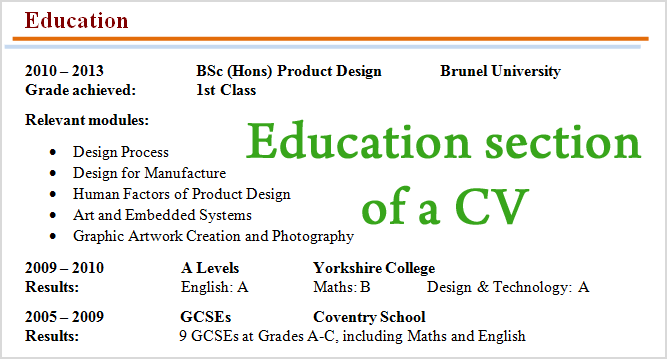Which Parts of Education Should I Include in My CV?

posted:4 years agobyAwatef Hamdiin CVs
Education plays a huge part in an individual’s life. Each person has reached a certain educational level and wants to use this qualification to get a job. A CV is the best document to include your educational details. But how can you perfectly list this achievement? Which comes first? Education? Skills? Or work experience? Are grades included? All these questions will be answered on Fratres. Keep reading.
The Education Section on a CV: Where Should I put it?
There are many types of CV. in each type has different content and sections to list important information about the applicant. Concerning the education section, the latter occupies a different rank, depending on your CV’s type. For example;
-In a skills-based CV, education comes after the personal summary. Fresh graduates or nonexperienced candidates always prioritize their recent educational achievement.
-In a chronological CV, education comes after work experience. In today’s job market, work experience has more emphasis than education. Follow 6 CV Trends of 2020 for Getting Fast Interview Call
Whatever is the type of your CV, the education section is essential to list your academic level. It introduces employers to the latest educational degree you have obtained and the specialties you have learned. Since education portrays your qualifications, the way you need to introduce these details depends on:
- Your professional history (an experienced or non-experienced candidate, a trainee)
- Your studies ( academic status, degrees, courses)
All these information are also different as they include dates and situations (graduated, on the way to graduation)
For example, the education section of someone who has just finished school is not the same as someone who has dropped School.
Adding to the basic educational system, applicants can include paid educational courses that culminate in a diploma such as,
-Hotel Management Courses
-Flight attendant Course
-Nursery Training takes a look at the What Words Should I Use on My CV?
How to List Education for Applicants who are Still Studying:
Even without a final degree, chances are always open for students to get a job. In this case, students are supposed to list the current degree with an anticipating future date, to inform employers that their qualification is in process.
If the job you have applied for requires specific modules such as Maths, biology, Data science, put the particular subject areas that give you access to this job.
Don’t forget that in both cases to mention the date. Employers want to know when you would finish your studies. The completion date helps employers to speculate about your availability and deduction for work. How you should list education is like this:
- The name of your anticipated degree
- The name of your college
- The expected date of graduation
How to list Education for Applicants who Left School:
School leavers are usually applying for blue-collar jobs or some jobs with GCSEs or A levels as qualifications. If you are planning to get a specific position such as a bookkeeper or a retail assistant, you should make a little effort to prove that your qualifications meet the requirements. This little effort consists of listing specific subjects and grades that are relevant to the job. For example, Maths and English grades can introduce school leavers to many industries such as Tesco Jobs.
The way to list your qualifications includes
GCSEs (the name of your School) + date
Selected subjects + grade
Here is an example:
GCSEs Secondary School ( the date you completed GCSEs)
Maths, English, Science A
How to List Education for Applicants who Graduated from College:

A fresh graduate lists the recent degree obtained, including the university’s name and the date. Of course, you can add previous educational qualifications to boost your CV’s education section. You can also include modules if the job you have applied for depends on a specific area of knowledge. The modules mentioned can draw the lines between you and other candidates who have the same degree as yours.
- University’s name
- Years of education
- Degree’s name with honors
If you are hesitant about what to mention below your degree, we recommend putting your A levels rather than GCESs. The importance of GCSEs is no longer the same for university undergraduates. It is better not to list them and save your CV space for more valuable information.
How to List Education for Applicants who Have Obtained a Training/Apprenticeship Diploma:
Artisans, workers, bakers have their way to list their qualifications. They should put the type of training/ course they have taken, the academic organization’s name/ the start and the finish date. They can also make another section below the education section for apprenticeship details. Take a look at How to Make a CV for your First Job?
How to List Education for Applicants who Have a Double Degree:

Applicants with more than a degree in two different fields can mention both degrees by prioritizing the degree that conveys the job you have applied.
Take a look at The Surprising Benefits of Graduating with a Dual Degree
How to List Education for Experienced Applicants:
Even if work experience is worth it for employers, education is still a bonus for experienced applicants. In this case, think about putting your best academic achievement. You have the ample choice in listing a significant degree with other subordinate educational achievements. You can also try another type of CVs, especially if you are into the tech industry. Why Do You need to Consider a Visual CV ?
These were the different educational achievements that applicants need to portray in a CV. Follow the examples and put the necessary changes related to your educational system.
